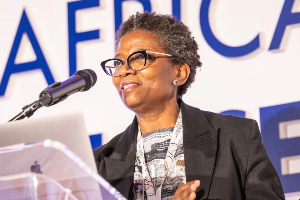 Professor Funmi Olonisakin, Vice President and Vice Principal of King’s College London
Professor Funmi Olonisakin, Vice President and Vice Principal of King’s College London
Day one of the inaugural African Peace & Security Dialogue commenced on October 4, 2024, featuring a profound address by Professor Funmi Olonisakin, Vice President and Vice Principal of King’s College London.
Her keynote speech underscored critical blind spots in Africa’s approach to peace and security, urging a reevaluation of external influences and internal norms to foster genuine transformation on the continent.
Prof. Olonisakin highlighted three significant blind spots that hinder effective conflict resolution in Africa. First, she criticized the prevalent reliance on external blueprints for managing African conflicts.
“Africa often overlooks those flaws and implements that external agenda without question and without adaptation,” she noted. She called for a paradigm shift where African nations prioritize ownership of their conflict resolution strategies rather than adhering blindly to external agendas.
The second blind spot identified was the disconnect between African and global norms regarding peace and security. While she acknowledged the transformational value of African peace norms, she emphasized the urgent need to align intentions with actions.
“I want to suggest that Africa’s blind spot lies in the failure to see the strength of its own norms and in a ready embrace of external, handed-down ideas as superior to its own homegrown ideas and agenda,” she stated. She urged attendees to determine which norms are essential for Africa’s transformation and the security of its people.
Prof. Olonisakin’s final observation concerned the leadership approach to Africa’s peace agenda, which she deemed “severely blinkered.”
She pointed out the disconnect at national, continental, and global levels, advocating for leadership that genuinely engages with the realities of the African populace.
Providing a broader context, she elaborated on the shifting global landscape, citing the decline of the liberal world order established in 1945. “But that liberal world order, based on the assumptions that liberal democratic norms, institutions and a rules-based system, offer the best solutions to global challenges, from globalisation to terrorism or public health, all of this is deeply questioned at the moment,” she remarked.
The current geopolitical climate, marked by increased tensions and conflicts, offers a unique opportunity for African nations to carve out their own path. However, she cautioned against complacency, stressing that many African countries are failing to take proactive steps to address internal conflicts.
Drawing on recent events, Prof. Olonisakin noted how the COVID-19 pandemic and the war in Ukraine have further highlighted Africa’s vulnerabilities. “We must examine the practical realities that confront Africa as we seek to locate ourselves, as we seek to locate Africa in this thing unfolding global disorder that is manifesting itself in what seems to be this continuous pyramid of western hegemony that’s parallel,” she urged.
The fragmented response to these crises has underscored the need for a cohesive African stance.
She further discussed the implications of unresolved conflicts, referencing ongoing issues in Sudan and South Sudan as illustrative of deeper systemic problems plaguing the continent.
“When leaders prioritize their power struggles over the welfare of their people, peace becomes an elusive goal,” she warned.
In closing, Prof. Olonisakin urged attendees to reconsider the relationship between leadership infrastructure and societal engagement. She emphasized the need for a leadership model that integrates both the structural elements (hardware) and the interpersonal dynamics (software) necessary for effective governance and conflict resolution.
The three-day event, which runs from October 4 to 6, aims to go beyond diagnosing Africa’s security problems. Organized by the Thabo Mbeki Foundation, the dialogue seeks to generate solutions to these problems, with a focus on reforming the AU’s mechanisms and empowering African states to take ownership of their peace efforts.
Present at the opening ceremony were former South African President, H.E. Thabo Mbeki; Zimbabwe’s Minister of Foreign Affairs, Hon. Frederick Shava; Tanzania’s Minister of Foreign Affairs and East African Cooperation, Hon. Mahmoud Thabit Kombo, among other distinguished personalities.
